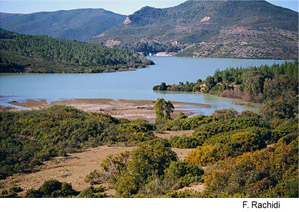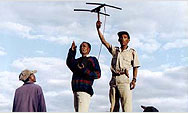Water and Coastal Resources
 |
USAID worked with local partners to improve water
resources management in Morocco’s Nakhla region
of the Rif mountains. |
Every ecosystem, society, and individual on Earth depends on water. Food security and human health, energy supplies and industrial production are all dependent on water to a large degree. Water plays an important role in regulating global climate. It is essential for plants and wildlife and ecosystems they inhabit. Water shortages and poor water management can lead to loss of biodiversity and agricultural production, increase in malnutrition and disease, reduced economic growth, social instability, and conflict.
Reliable water supply has been a fundamental component of the increased agricultural productivity achieved by the green revolution. Irrigated agriculture currently uses 70 percent of the world’s developed water supplies. With increasing competition for water to meet domestic and industrial needs, and for servicing essential ecosystems, agriculture is faced with producing more food with less water.
Water resources are not distributed uniformly across the globe — nor are they necessarily located where the largest concentrations of people reside. Demand for water outstrips supply in a growing number of countries, and the quality of that supply is rapidly declining. Four hundred and fifty million people in 31 countries already face serious shortages of water. These shortages occur almost exclusively in developing countries, which are ill-equipped to adopt the policy and technology measures needed to address the crisis. By the year 2025, one-third of the world’s population is expected to face severe and chronic water shortages.
Exacerbating the problem, human activities often contaminate the world’s limited freshwater resources, making them unavailable for further human use and threatening the health of the lake, river, and wetland ecosystems they support. Likewise, coastal and ocean systems are under threat from the impact of a broad range of human activities. Coastal systems are particularly vulnerable to degradation from land-based activities, climate change, over-fishing, and damage to coral reefs, and they require active intervention to ensure their continued survival.
The U.S. Agency for International Development has made the preservation and environmentally sound development of the world’s water resources a top priority. The Agency’s investments have helped improve access to safe and adequate water supply and sanitation, improve irrigation technology, enhance natural environments, and develop better institutional capacity for water resources management in countries around the world. This has supported the Agency’s underlying goals of reducing conflict and improving the welfare of people across the globe.
|


